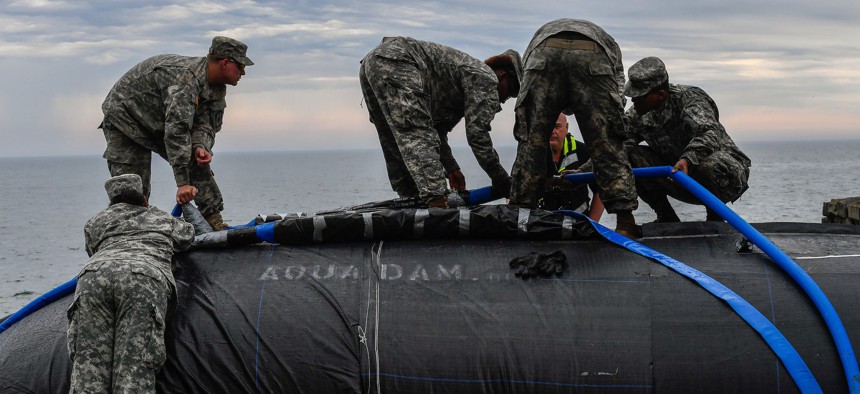Cuomo Dispatches Portable Dams to Fend Off Lake Ontario Flooding in Upstate New York

Courtesy New York Gov. Andrew Cuomo's Office The National Guard fills portable, temporary dams along Lake Ontario in New York state.
The high water levels aren’t expected to recede for months.
The International Joint Commission, the board jointly run by the U.S. and Canada to control water levels in the Great Lakes, announced on Wednesday it would immediately increase the amount of water flowing out from Lake Ontario through the St. Lawrence River.
In the Great Lakes, a wet spring has led to high water levels, but especially for Lake Ontario, which is 3 feet higher over last year. Ontario’s water level is now the highest for the month of June since a high-water mark was recorded in 1952. The bad news: Ontario’s high lake level isn’t expected to drop in any meaningful way for several months.
Along Lake Ontario and the St. Lawrence River in New York state, which drains the entire Great Lakes Basin, waves and flooding have damaged homes and public and private breakwaters plus closed some local roads.
New York Gov. Andrew Cuomo has deployed emergency state resources to communities impacted by the lake flooding, including portable, inflatable dams to protect vulnerable areas in the communities of Greece and Sodus Point, near Rochester. The state’s response includes $500,000 to reimburse the each of the local communities.
The governor has criticized the IJC for not increasing Lake Ontario’s outflow sooner. “I think they pulled the trigger too late” to reduce the water levels, Cuomo said, according to the Associated Press .
The IJC has defended its water management saying that nobody could have predicted this spring’s record rainfall.
While water levels are not nearly as high in the upper lakes—Huron, Michigan and Superior—shorelines are more vulnerable to wave-generated erosion. Still, marinas and yacht clubs have been facing tough decisions on whether to raise fixed docks to stay above water.
"We're not there yet, but we are looking at that," Larry Taunt, commodore for the Muskegon Yacht Club in Muskegon, Michigan, told the Detroit Free Press .
Michael Grass is Executive Editor of Government Executive’s Route Fifty and is based in Seattle.
NEXT STORY: Texas Governor Slashes State Air Quality Funding






